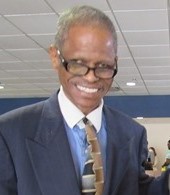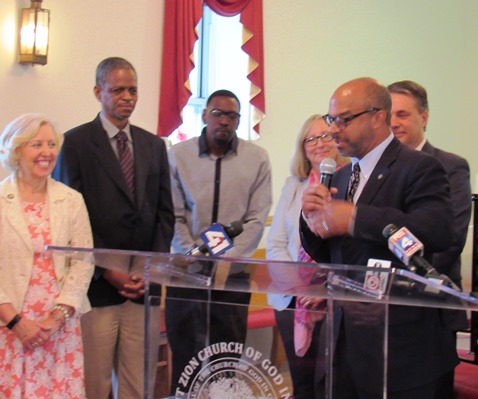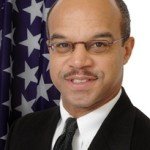Window
Opinion column

by Mary Rupert
One of the most successful human rights activists in the area, Alvin Sykes, died Friday morning, nearly two years after a fall at Union Station landed him in a nursing home.
“He was such an influential part of social justice and human rights in this area,” recalled State Sen. David Haley, D-4th Dist. “I can’t think immediately of anyone who worked more tirelessly toward that goal than Alvin Sykes.”
“On a personal note, my legacy as a legislator is most noted by legislation that he originated and encouraged me to support,” Sen. Haley said.
Sykes was the impetus behind Sen. Haley’s supporting the wrongful incarceration compensation law, creating a DNA cold case task force, Scruffy’s law against animal cruelty, medical marijuana, eyewitness standard benchmarks, audio-visual recording for all felony cases, and hate crimes enhancement legislation, Sen. Haley said.

Those measures and more were a result of the advocacy of Sykes bringing them to him, and then insisting that he do something with them to see them through the process, Sen. Haley said.
This year, the governor issued a statement favoring medical marijuana, but for many years, Sen. Haley was the only one proposing it in the Kansas Legislature. In 2008, Sen. Haley proposed legalizing medical marijuana after he was urged by Sykes to address the issue. Young black men were being disproportionately arrested and jailed on possession charges, and Sykes urged Sen. Haley to do something about it. More than 10 years went by, and other states passed legalization laws while Kansas still debated it.
In many ways, Sykes was ahead of his time.
Sykes did not advocate only at the Kansas legislative level, Sen. Haley said. He also was active in Missouri state advocacy, as well as at the federal level. He worked with legislators on both sides of the aisle. A high mark of Sykes’ activism was the passage of the Emmett Till legislation in Congress. Cold civil rights cases could be reopened years after they had been closed.
Sykes was on his way to visit the Rev. Wheeler Parker, a cousin of Emmett Till’s, when Sykes fell in March 2019 at Union Station in Kansas City, Missouri. Sykes had been instrumental in changing the federal law, allowing for prosecution to take place decades after the 1955 racially motivated lynching in Mississippi.
Sykes, 64, was at a rehab facility in Johnson County when he died. A self-taught activist, Sykes spent many hours of his life researching the laws at the area’s public libraries, then contacting legislators. He was a scholar in residence at the Kansas City, Missouri, Public Library.
“His legal acumen was far superior to me,” Sen. Haley, who has a law degree, recalled.
Sykes read to study, learn and apply what he learned, Sen. Haley said. “He was on a mission, his mission was to bring knowledge to light as it should apply in the legal system, and in parity for all people,” he said.
Sen. Haley said he would occasionally meet with Sykes at Fritz’s restaurant on 18th and at other places to discuss human rights legislation, before Sykes’ fall. They had some occasionally heated discussions on the issues.
Sometimes Haley was mindful of how the legislation would affect his chances of getting re-elected, but Sykes would continue to advocate for bills that would advance human rights. Sykes was persistent, always.
Sen. Haley said he was talking to Sykes a few days ago about legislation that Sykes was interested in getting passed, and he had been planning a meeting with him soon.
Though flat on his back at a nursing home, Sykes was still working on writing the story of his life and other issues, he said.
“I can’t believe he’s gone,” Sen. Haley said.
“Alvin was a wonderful advocate,” Sen. Haley said. “He shook you to the core and made you think. There’s nobody like him, just nobody like him that I’ve ever met. He called me his big little brother.”
Active for decades in the fight to maintain rights and fight for minorities, Sykes was quick to let people know that he didn’t want to be known as a “civil rights activist,” he was a “human rights activist.” He advocated for rights for everyone.
In an interview in April 2018, Sykes said that he was confident that progress was being made in human rights, and he felt he had achieved some of his goals. He told us about how Buddhist beliefs influenced his work.
So much of his work was about getting the truth, and then seeking closure, he told us in 2017.
Sykes did more than just notice that things weren’t right in this world. He took it a step further, doing the research necessary to find out why it wasn’t right, and then taking steps within the system to change it.
Services for Alvin Sykes have been scheduled. Viewing will be from 9 a.m. to 11 a.m. April 1, followed by services at 11 a.m. April 1 at Metropolitan Missionary Baptist Church, 2301 E. Linwood Blvd., Kansas City, Missouri.
A Go Fund Me page has been established to help with the cost of Alvin’s memorial service, at https://www.gofundme.com/f/alvin-sykes-memorial-fund?member=9501212&utm_campaign=p_cp+share-sheet&utm_medium=copy_link_all&utm_source=customer.
To see some earlier stories about Alvin Sykes and his work, visit:
https://wyandotteonline.com/closed-case-dna-bill-passes-senate/
https://wyandotteonline.com/sykes-to-receive-peace-builder-award/
https://wyandotteonline.com/kck-human-rights-activist-optimistic-about-reaching-goals/
https://wyandotteonline.com/local-activist-and-others-take-a-new-look-at-the-emmett-till-case/
https://wyandotteonline.com/human-rights-activist-to-receive-award-tonight/
To reach Mary Rupert, editor, email maryr@g3f.1db.myftpupload.com


